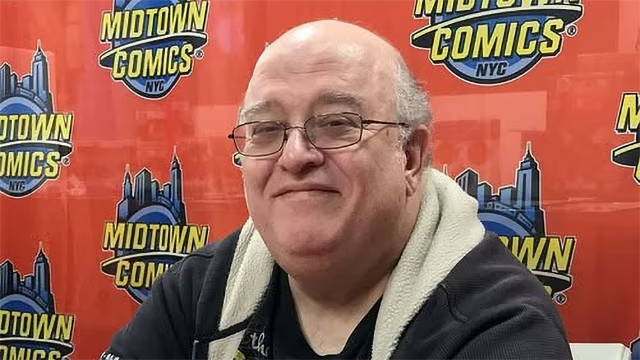by Thaddeus Howze, with contributions by Susan Macdonald
Peter Allen David, lovingly referred to as PAD to legions of readers, passed away on May 24, 2025, at the age of 68, following a long illness. His wife confirmed the news, marking the end of a towering career that helped define modern comics and genre storytelling. His illness was no secret; fans rallied around him with GoFundMe campaigns to help cover the costs of his care.

A prolific and versatile writer, David’s career began not in comics, but in prose and journalism. His keen wit and sharp storytelling earned him a position in Marvel’s sales department during the 1980s, a foot in the door that led to his first published comic story in The Spectacular Spider-Man #103 (1985). From there, his voice became unmistakable: funny, humane, and layered with deep characterization.
My introduction to PAD was his run on The Incredible Hulk, particularly the story Future Imperfect, where we meet the mad incarnation of the Hulk—the hedonistic, sadistic murderer known as the Maestro. It had been a long time since I’d seen a version of the Hulk that could terrify even Professor Hulk.
The story was a perfect fusion of time-traveling madness, a descent into a dark future shaped by unchecked rage. It remains one of Marvel’s bleakest dystopias, featuring Rick Jones’s trophy room, a shrine of artifacts from heroes the Maestro had killed. Like any good Chekhov’s gun, that scene would return to haunt readers later, showcasing David’s signature use of cyclical narrative framing. His Hulk was a damn fine series of stories.
His twelve-year tenure on The Incredible Hulk is legendary, turning what could have been a simple monster book into a psychological epic exploring identity, trauma, and redemption. That run, frequently cited as one of the best in Hulk’s history, cemented PAD’s status as a master craftsman of serialized storytelling.
But his legacy didn’t stop with the Hulk. PAD’s fingerprints are on some of the most enduring titles and characters of the late 20th and early 21st centuries:
- Spider-Man 2099, where he reimagined Marvel’s flagship hero as the intrepid geneticist Miguel O’Hara in a cyberpunk future. This version of Spider-Man appeared in the recent Spider-Verse animated films featuring Miles Morales.
- X-Factor, especially the noir-tinged relaunch that brought a detective sensibility to mutant drama. It was in the pages of X-Factor that he created the oft-ignored mutant rights group: M.O.N.S.T.E.R – Mutants Only Need Sympathy, Tolerance, and Equal Rights. He expressed disappointment that M.O.N.S.T.E.R. did not carve a permanent niche into the Marvel Universe.
- Young Justice and Supergirl, where he brought humor, heart, and high-concept drama to DC’s roster. David’s Young Justice gave the series a much-needed sense of continuity and character growth.
- Captain Marvel and Fallen Angel, both demonstrating his gift for reinvention and subversion. His introduction of Genis-Vell to the Captain Marvel legacy featured both tragedy and triumph, framing a controversial hero with a haunting legacy..
David also ventured beyond comics, contributing to television, video games, and an extensive bibliography of novels—both original works and media tie-ins, including memorable Star Trek stories that made him a fan favorite across fandoms. His Star Trek work includes comic books and novels such as the New Frontier book series. David’s other novels include film adaptations, media tie-ins, and original works, such as the Apropos of Nothing and Knight Life series. His television work includes series such as Babylon 5, Young Justice, Ben 10: Alien Force and Nickelodeon’s Space Cases.
Hid first novel, Knight Life, published in 1987, was a contemporary Arthurian fantasy. He later expanded it into a trilogy with One Knight Only and Fall of Knight.
Peter David wasn’t just a writer, he was a chronicler of what made heroes human. He balanced pathos and punchlines with unmatched ease, and his work introduced generations of readers to the possibilities of character-driven genre fiction. His contributions shaped not just individual titles, but the way writers approached superhero storytelling as a whole.
He is survived by his wife and children, and by a creative legacy that spans decades, genres, and mediums. In every issue, in every story, Peter David reminded us that the truest battles are often internal, and that heroism can be found in vulnerability, laughter, and love.
He will be deeply missed, and always remembered. My condolences to his family and friends.



Awards and Honors
- 1992 Eisner Award for Best Writer/Artist or Writer/Artist Team (shared with Dale Keown for The Incredible Hulk)[159]
- 1993 Wizard Fan Award
- 1993 UK Comic Art Award
- 1994 Golden Duck Award for Young Adult Series (for Star Trek: Starfleet Academy)
- 1995 Australian OZCon 1995 Award for Favorite International Writer
- 1996 Haxtur Award for Best Script (for Para que la oscuridad no nos alcance [“So That the Dark Does Not Reach Us”], in Hulk La caída del Panteón [Hulk: The Fall of the Pantheon]
- 2007 Julie Award for achievements in multiple genres[161]
- 2011 GLAAD Media Award for Outstanding Comic Book (X-Factor vol. 3)
- 2011 International Association of Media Tie-In Writers Grandmaster Award (aka Faust Award)
- 1992 Haxtur Award for Best Script (for Crónicas de Atlantis)
- 1992 Prometheus Award for (Star Trek: The Rift)
- 1992 Eisner Award for Best Continuing Series (shared with Dale Keown for The Incredible Hulk)
- 1994 Eisner Award for Best Writer (for The Incredible Hulk)
- 1995 Haxtur Award for Best Long Story (shared with George Pérez for Sachs & Violens)
- 1997 Cable Ace Award for Best Children’s Series (shared with Bill Mumy for Space Cases)
- 1998 Harvey Award for Best Single Issue or Story (shared with Adam Kubert and Bobbie Chase for The Incredible Hulk #-1)
- 1999 Eisner Award for Best New Series (shared with Todd Nauck and Larry Stucker for Young Justice)
- 1999 Eisner Award for Best Title for a Younger Audience (for Young Justice)
HAIL THE TRAVELER
We commit you back from where you came, to the arms of your ancestors.
May there be peace where there was anger.
May there be healing where there was hurt.
Go quickly to the place that your old ones called home.
For those who grieve for your passing, let there be healing.
For those who grieve for who you were, let there be healing.
For those who grieve for what you could have been, let there be healing.
Hail the Traveler. We celebrate your journey.
![]()
Thaddeus Howze is an award-winning essayist, editor, and futurist exploring the crossroads of activism, sustainability, and human resilience. He's a columnist and assistant editor for SCIFI.radio and as the Answer-Man, he keeps his eye on the future of speculative fiction, pop-culture and modern technology. Thaddeus Howze is the author of two speculative works — ‘Hayward's Reach’ and ‘Broken Glass.’













You must be logged in to post a comment.